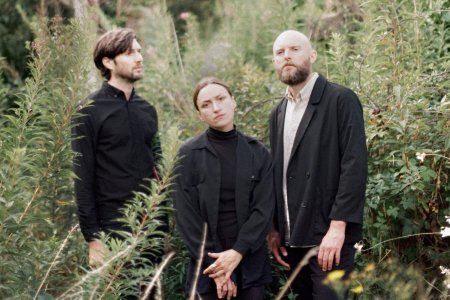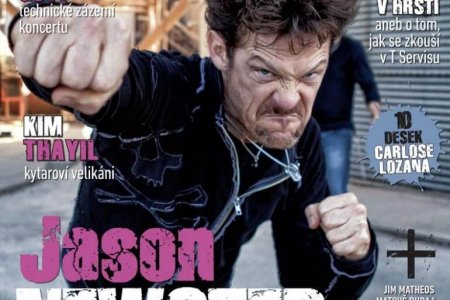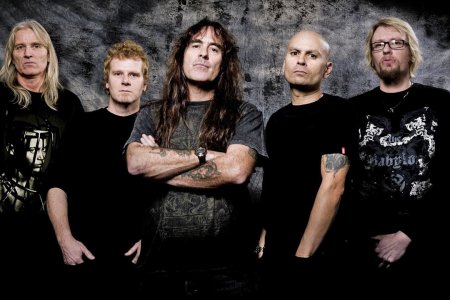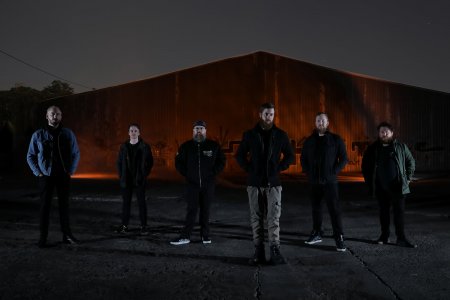British band The Pineapple Thief has been on the scene for almost twenty years. Founding member and brain of the project Bruce Soord already accommodated with its non-mainstream, but highly respected position, especially among prog rock fans. Nevertheless, due to this rough journey he got to know himself and built foundations for the years to come. Great example is The Pineapple Thief’s eleventh album Your Wilderness. Czech fans have a chance to see the band live on 27th January in Prague, most probably the only time with Gavin Harrison (Porcupine Tree, King Crimson) on drums.
Looking at your tour schedule, I’m glad to see, you will be coming to Prague at the end of January. Will this be your first time playing in the Czech Republic?
We did actually play in the Czech Republic, at a festival, but unfortunately it was a particularly disastrous show, because our drummer pulled out. We used a guest drummer and things went terribly wrong on stage. So, I would say this will be our first proper show.
Just a few moments before this interview I realized, Darran Charles, who was arranging this interview will be joining you, not only as a live guitarist, but also playing with his band Godsticks as a support band. This is some hell of a multitasking…
I think that’s kind of necessary now. Being in a band, you really have to take a lot of jobs to make it work. Working with Darran has been really great ever since he played with us five or six years ago. So we have remained friends and it’s working out well.
Leaving the magnolia field
To be honest, I discovered you guys through your previous album Magnolia, which became, since it was released in 2014, one of my most favorite car albums. It is so positive and catchy but compared to that, the new album’s atmosphere is completely different. I feel, it’s much more emotional, deeper, so I was wondering, what motivated you to go this direction?
It was a conscious decision naturally. I remember when we finished Magnolia, I decided the band to take a different direction. Not necessarily radical, but like you said, to focus rather on the atmosphere: Maybe, to make it less of a car album and more of a lounge album; (Laugh) something, where you sit and listen carefully. So it was not necessarily so critical to have those catchy choruses. Even though melodies are still important, it was a slightly different emphasis in terms of what the listener can get out of the music. It was more of a journey than on Magnolia, where I felt, I have done it and fancied doing something differently.
From the songs, I would like to mention first of all Take Your Shot, which has a very unique atmosphere and in the certain sense reminded me of my numerous favorites within the post rock scene. I can imagine, you took some inspiration from the beauties of the nature, but as a fan of the movie Interstellar, I was wondering what are some of the other sources?
So many musicians I know are into science fiction and in my very first band, in the late eighties, we always used to get together and watch Star Trek. That was part of our rehearsal night. So it is kind of ingrained in our souls, I think. And also our bass player works for NASA, where he is testing satellites. We got some interesting connections to the interstellar world.
Very interesting is also your main single and probably the catchiest tune on the album, In Exile. In this case I was mainly caught by the lyrics, which seem very personal and related to relationships. Is the mood of the album related to some strong stories of yours and your friends?
I think without a doubt, that’s what inspires it. I remember, when I was writing Your Wilderness, there were a lot of things happening around me. Especially some family situations, where you witness people, who’ve been together in loving relationship all their lives, suddenly things get broken up. Children get estranged from their families or the other way around, where families or parents get estranged from their children. I look at it and I feel it’s such a tragic and a horrible thing. So that inspired a lot of lyrics, but I always had to count on reconciliation. There had to be some kind of light. With all the songs, I just try not to make it too hopeless, too dark.
I am glad you mentioned the importance of family and friends, as you were joined for this album and upcoming tour by Gavin Harrison on drums. Please tell us how did the songwriting go and if everybody did participate?
I think, with this record there were some major differences. With Magnolia it was probably more of a case, where I would get the demos up to a quite high standard, so everybody would know exactly what they are doing. With Your Wilderness, especially with Gavin on drums, I decided to take a real back seat. I came up with a general concept for the songs, top lines and further progression, but I let everybody else do their own thing. I think when the band heard Gavin’s contribution; You know, I mean, I didn’t give Gavin any instruction, and what he came up with were such inspirational parts, it kind of raised everybody else’s game. Jon, our bass player got really excited and he came up with the best bass playing, I ever heard him do. And also having Darran being able to contribute his technically fantastic guitar playing really made a big difference. I think Your Wilderness is without doubt the biggest band album that I have done. The real band effort and me writing the songs, is a small part of the final product.
It sounds like a perfect moment to use some journalism cliché as: “With your eleventh album, your lifetime work has finally paid off and you have a stable base for another ten albums.” (Laugh)
(Laugh) I hope so. I feel really privileged we are still doing it. Think about it, eleven records! You are right, we started off with some really humble beginnings. A lot of it was just me on my own, for the first four or five albums. So, to be in a position now, like you say, we can really do what we want, is more than I could even wish for. So I’m really excited about the future.
No matter how confident and individual you are in your approach to songwriting, you always need to have good people surrounding you, to help you
Another very interesting song from the new album is Fend for Yourself where you used a clarinet. It’s a rather rare instrument, but I am used to its sound, as one of my closest friends and an ex-roommate used to play it a lot. Have you ever used it before, as I think, one has to be pretty brave to use it in prog rock?
Yeah! The thing with Fend Yourself is we got John Helliwell from Supertramp to play on the album. I remember speaking to him and I said: “Actually, my most favorite solo you ever did wasn’t on the saxophone,” for what he is obviously most famous for, “but on the clarinet in the track Poor Boy.” I really loved it, so I asked him to play clarinet on this song. I remember when I told the band we will put a clarinet on this piece and they were like: “Wooow, what are you talking about?!” It’s such an unusual thing to do. However, that’s a thing now! Everything goes…
That’s why I would like to know your opinion about trumpet and saxophone. I spoke about it some time ago with René Rutten from The Gathering, as they have included a trumpet on their latest releases, even though he hated trumpet and saxophone most of his life because of the eighties music. But we agreed these instruments are finding their way back into music and I think, great examples are also the avant-garde metal US bands Kayo Dot and Yakuza.
I would certainly ignore saxophone for its bad reputation it got, as you say, from the eighties – “really cheesy saxophone”. But you are right, it’s kind of making its way back as a cool instrument. I love the trumpet, because on Magnolia we had a small trumpet solo on the last track Bond. It was the first time we had a trumpet, but when I think about it, I used trumpet on some early The Pineapple Thief songs. I would certainly be open for trumpet work in rock, more than saxophone, I guess.
You never know, what it will be like, until you are on the road with the band
You also used on the album a string quartet and a four-piece choir. Any chance we will be able to see part of that live?
I don’t think we will be touring with live strings and we will keep the line-up as a five piece, including a second guitarist. However the big thing about this tour is, we managed to get Gavin to join us on the road. I think it will be a onetime only deal with Gavin…
So you are not expecting any full time cooperation with Gavin?
I don’t know. We will see how it goes. Obviously Gavin has never toured with us. From his perspective, he is probably not sure. You never know, what it will be like, until you are on the road with the band. However I really hope we can do it again. But Gavin is busy with King Crimson and other stuff, so we’ll see.
Kscope VIP club
I can fully understand that, as when someone opens a list of Kscope bands, I can see both of you, in a number of projects. I mainly enjoyed your cooperation with Jonas Renkse from Katatonia on Wisdom of Crowds.
Yeah, it’s very natural for us and hopefully we will be making another album soon. I was just speaking to Jonas and hopefully later this year, he is going to come over to my place and we are going to do a second album.
That’s great to hear. I spoke to Jonas twice and he is one of the greatest singers on the scene. But at the same time, he is very sensitive and it’s really hard to get his attention and trust. But eventually, when you do, he opens up and he is such a friendly guy.
Yeah. (Laugh) I think that’s a Swedish thing as well! (Laugh) I have known Jonas really well, so yeah, he is the nicest guy you can meet.

Wisdon Of Crowds
When we are talking about Kscope, you actually did some nice promotion for your current support band, by wearing a Godsticks t-shirt on Wisdom of Crowds promo picture.
Oh yeah. (Laugh)
I find the whole list of Kscope bands very interesting. I’m a big fan of Tesseract, I love Anathema so much and I guess everybody loves Steven Wilson. It feels like a very healthy community of amazing musicians, as for example, Steven Wilson helps you out, Daniel Cavanagh of Anathema joins you live and it seems like an incredible VIP club.
(Laugh) Yeah, now I realize how lucky I am, to be in this club. When I first joined, Kscope didn’t exist, so I think, I was one of the very first bands that gave them an idea to start a new progressive rock label. I think Steven Wilson has also spoken some good words for me. They‘ve done a Blackfield album and some Porcupine Tree reissues, but Kscope didn’t exist. Over the last ten years, I am glad to see how they grew and did some big signings as Tesseract. It’s a great club and I do a lot of mixing as well. I did let’s say a 5.1 mix of Tesseract’s Polaris and got to know the guys a little bit, when I was doing that. Everyone is so nice, there’s no ego and it’s all about helping the band. So it feels really good and also the label is amazing. Even though they got a business to run, Kscope really cares about their artists. I’m really lucky to be there.
I spoke to Tesseract’s bass player Amos recently and he is also heavily involved in the production and post production phase. How did you manage to separate the roles?
They are running a great mastering business and they’ve got a fantastic studio, where they record their albums. But a 5.1 mix, if you want to do it in a surround, is not done by many people. So they had to come to me, to help them out. Steven Wilson is also doing it, but he is pretty busy now.
Yes, I remember him doing not only let say Anathema’s We’re Here Because We’re Here but also remixes of some seventies prog rock classic as Yes, King Crimson or Jethro Tull. I am glad you are sharing the same interest, but do you also share Steven’s philosophy: “One should have a proper listening room,” as he once told me? Personally I love listening to music in a train, on my Sennheiser headphones and Sony Walkman…
I can see his point, but I would say, music can be enjoyed anywhere. Even though I see a kid enjoying music out on a speaker or an iPhone, awful as it sounds to me, if he is enjoying it, than it’s fine. I would not go up to him and say: “What are you doing? You need to sit in a listening room!” (Laugh) On the other hand, for 5.1 you obviously need to have speakers behind you, a subwoofer and all that kind of stuff. So you probably do need to have a specific room. Also I realized, nowadays a lot of people have 5.1 systems in their car. So plenty of the releases I do are enjoyed, as plenty of fans write to me, in their cars on the way to work. So I think it can be listened anywhere.
Glad to hear you have quality roads in Britain. The Czech Republic takes good care of its heritage, but we really suck in making roads. Recently, I had in Prague some family friends from Serbia and they were amazed by the city and nature, but they could not believe the highways. They are made pretty cheaply, so they have to be repaired constructed all the time, so I guess the only music, you can enjoy on Czech highways is Slayer.
(Laugh)

During the last four or five years I’ve learned to take a step back
Alpha & Omega
If we take the whole process on making the album, you are involved from the first point, till the last. How do you manage to keep a healthy artistic distance to be critical enough?
That’s difficult and I am really lucky that I am surrounded by people I trust and know. During the last four or five years I’ve learned to take a step back. Simply, get to a point where I am confident and then to allow the rest of the band to clarify that. And quite often, I think I have done something great but they would say: “Hold on Bruce, I’m not sure, if this is going to work.” In retrospect, I have to say, they were always right. But there were another several occasions, where the rest of the band insisted to hear the demos that I haven’t shared; the ones I thought weren’t good enough. Quite often they would say: “Bruce, what are you doing? This song is great. You got to work on this more!” So, no matter how confident and individual you are in your approach to songwriting, you always need to have a good people surrounding you, to help you.
Just a few moments before this interview I realized, Your Wilderness was released with bonus disk 8 Years Later. What was the impulse to make this album and can we relate it to 8 Days bonus disc, you did for Variations on a Dream album back in 2003?
To be fair, Steven Wilson really pioneered doing elaborate special editions. For our new album, we did a twelve inch hard book, released with three discs: DVD with a 5.1 mix, the main album but the label said: “Can we also have a bonus disk? Do you have any demos or acoustic versions?” I agreed with a third disk, but I decided to make it really special and do a whole album. Over the course of a couple of weeks, we just wrote and recorded an album. I think it came out really well. It was the same concept I used to do, back in the day with Variation on a Dream, where again a label said: “Bruce, we can do a bonus disc for first 1000 of pressings!” So I said: “Let’s try to make an album in eight days!” That’s why we have called it 8 Days, because you write, record and mix an album in eight days. So now we used a similar concept, but didn’t rush too much to make it special.






